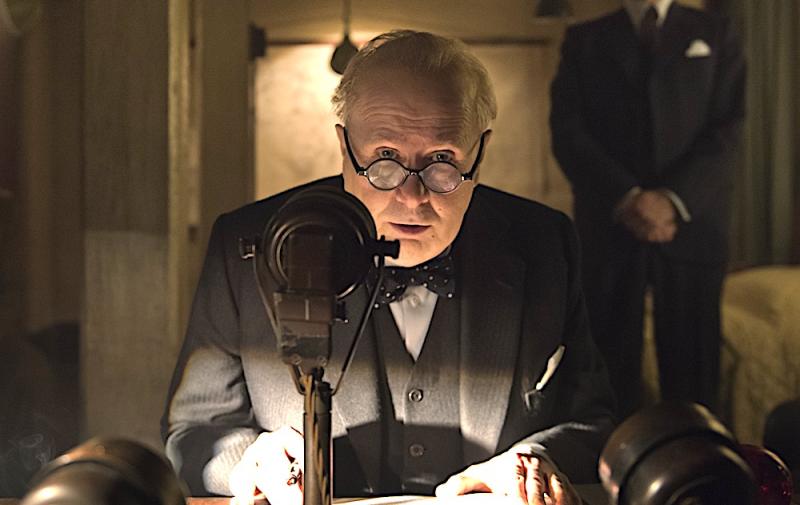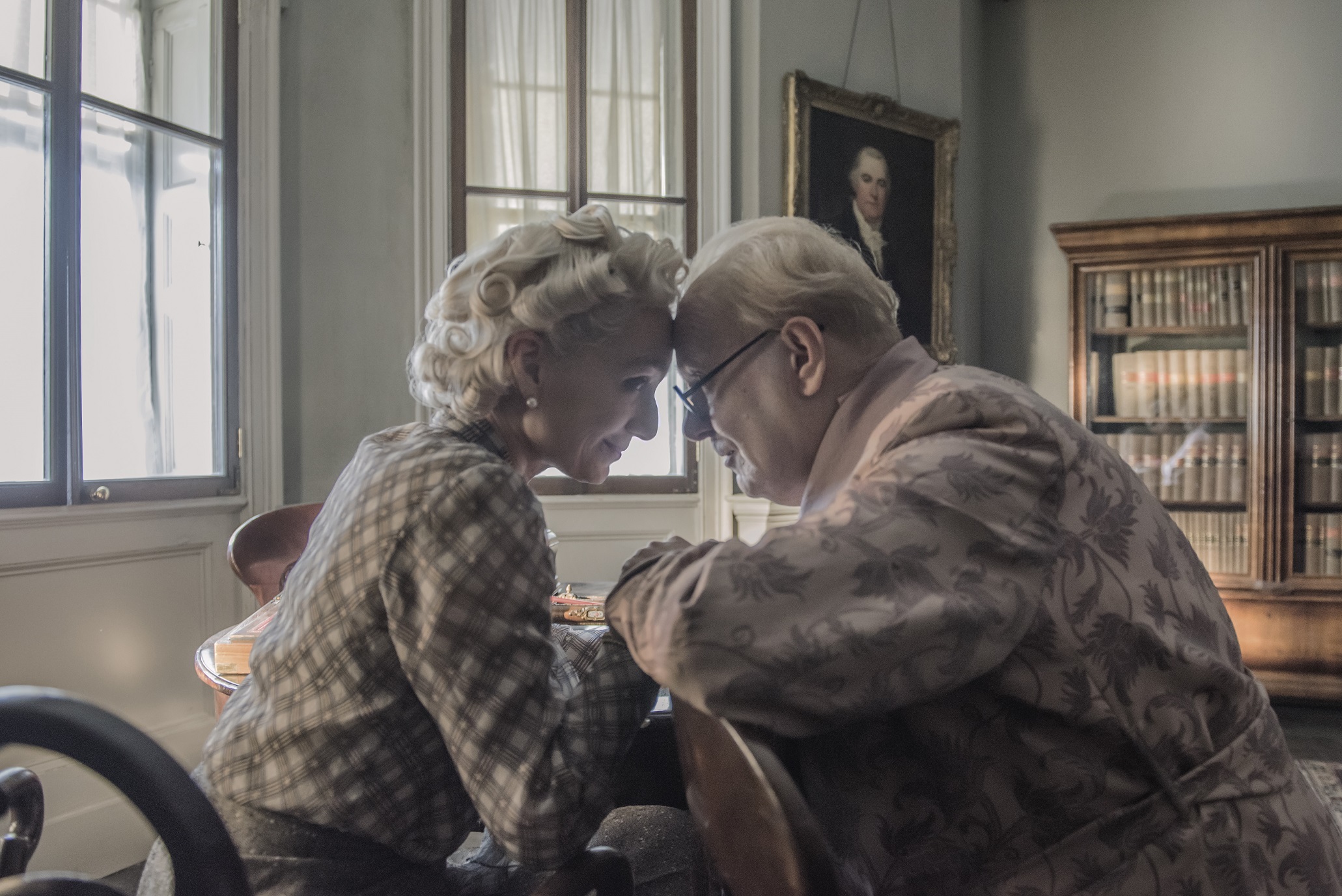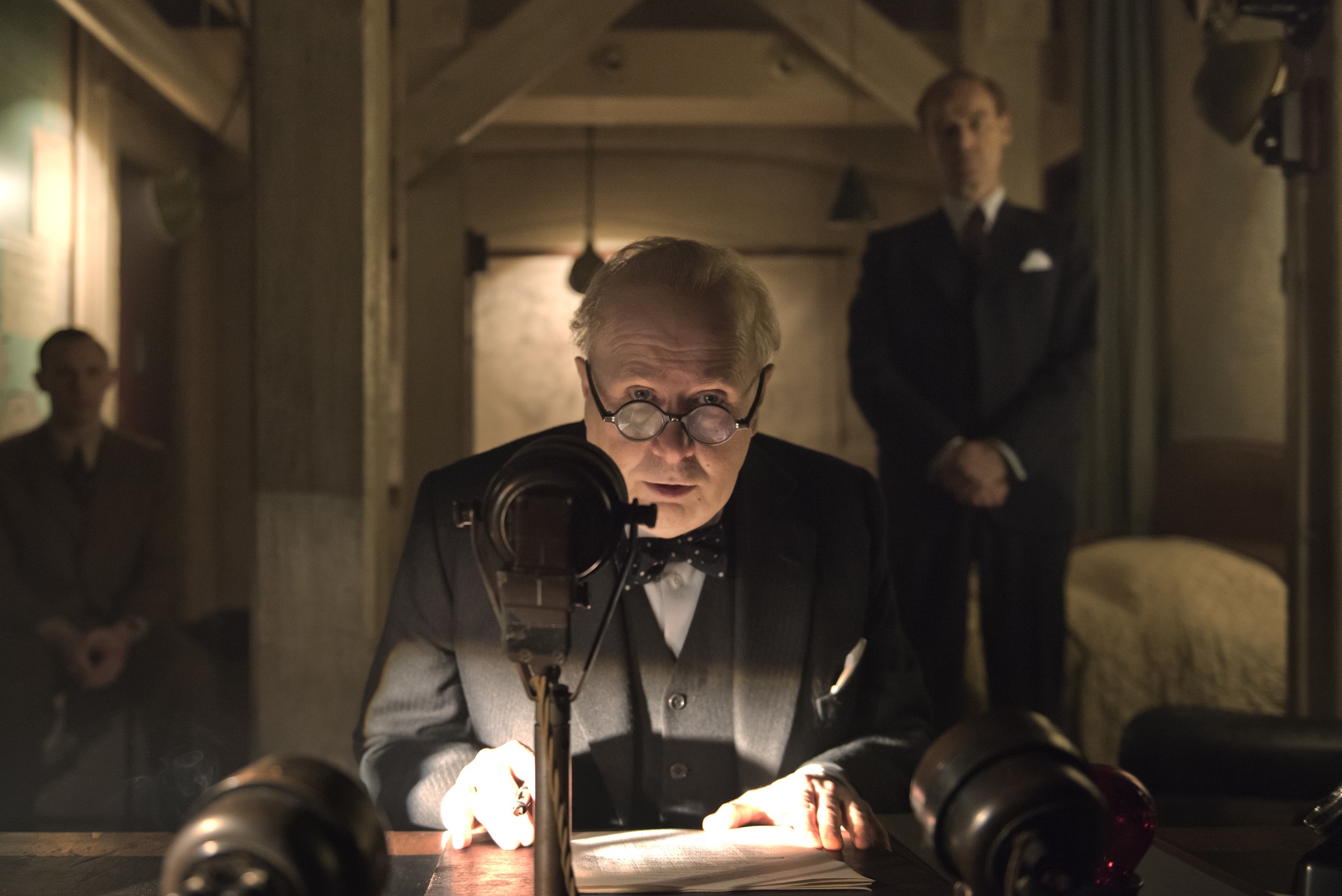Darkest Hour review - Winston airbrushed for the 21st century | reviews, news & interviews
Darkest Hour review - Winston airbrushed for the 21st century
Darkest Hour review - Winston airbrushed for the 21st century
Gary Oldman tilts for an Oscar as a panicky, powerhouse Churchill

The Great Man theory of history is applied by Darkest Hour director Joe Wright to his star Gary Oldman as much as their subject Winston Churchill.
“Which self shall I be today?” Anthony McCarten’s script has Churchill say. “My emotions are unbridled. A wildness in the colour...” Or, as a fellow parliamentarian puts it: “I wouldn’t let him borrow my bicycle.” Set between Chamberlain’s resignation and Dunkirk’s aftermath, as France falls and beaten peace seems Britain’s rational fate, this Churchill hasn’t yet been moulded by his radio speeches into a national figurehead. He can look, and feel, a failure-tarred liability. As his wife Clementine, Kristin Scott Thomas (pictured below with Oldman) built her part up but, like Lily James’ secretary Elizabeth Layton, still does little but be supportive. Oldman’s own fierce, witty intelligence blazes through the make-up, and finds Winston’s love for his wife. His acutely alert eyes, watery with age, have it. His relationship with a suspicious George VI is more interesting. Ben Mendelsohn, an Australian with Oldman’s former capacity for fearsomely unpredictable characters, brings an outsider’s unsentimental, undeferential toughness to the part. Darkest Hour’s flaws are still clear even here. “Were you close to your parents?” the King asks his PM, with screamingly unlikely, touchy-feely concern.
His relationship with a suspicious George VI is more interesting. Ben Mendelsohn, an Australian with Oldman’s former capacity for fearsomely unpredictable characters, brings an outsider’s unsentimental, undeferential toughness to the part. Darkest Hour’s flaws are still clear even here. “Were you close to your parents?” the King asks his PM, with screamingly unlikely, touchy-feely concern.
Wright’s efforts to break open the script’s parliamentary chamber piece fussily fail. Whether blacking out the screen around an isolated Churchill or showing the war with clunking CGI, this remains a film about old aristos talking. Chamberlain (Ronald Pickup) and his preferred replacement Lord Halifax (Stephen Dillane) are the film’s sclerotic villains, their understandable, World War One-informed wish to avert more bloodshed in seemingly certain defeat rarely given real credence. Churchill’s own agonies on this score are, though, a useful corrective to popular memory. This is still a symbolic Winston, refashioned for contemporary audiences as a people’s Prime Minister. The scene where he resolves to fight on is this tendency’s nadir. Slipping onto the Tube, he asks startled fellow passengers for advice. The two-minute journey between St James's Park and Westminster stretches interminably on, as a caricatured London cross-section pluckily refuse Hitler’s terms.
This is still a symbolic Winston, refashioned for contemporary audiences as a people’s Prime Minister. The scene where he resolves to fight on is this tendency’s nadir. Slipping onto the Tube, he asks startled fellow passengers for advice. The two-minute journey between St James's Park and Westminster stretches interminably on, as a caricatured London cross-section pluckily refuse Hitler’s terms.
Darkest Hour joins Dr Who’s last season in no longer portraying pre-1950s Britain as an all-white world, and a hip West Indian is among the passengers heard by his avuncular PM. The Empire’s, and Churchill’s, true race relations are better exemplified by his culpable indifference to Bengal’s 1943 famine. As for his appeal to the masses, the hostility directed to my grandmother for her Churchill surname in East London ration queues anecdotally confirms spotty popularity there. His triggering of the Blitz by bombing Berlin wouldn’t have helped, if known; nor would his shepherding of the Luftwaffe from West to East End. Darkest Hour’s 21st century Winston airbrushes too much from the Victorian imperialist who led our anti-fascist fight.
Darkest Hour’s contention that the decision to stand alone in 1940, preventing total Nazi victory, trumps all, is one most Britons likely believe in their hearts. Dunkirk, though, gave that national heroism more visceral form and flight. As to that improbable tube ride, McCarten defends it as a composite of various off-piste ventures. It’s still dramatically absurd. I’d say it betrayed Oldman’s carefully showy turn, if the whole film didn’t loyally frame him.
more Film
 Fantastic Machine review - photography's story from one camera to 45 billion
Love it or hate it, the photographic image has ensnared us all
Fantastic Machine review - photography's story from one camera to 45 billion
Love it or hate it, the photographic image has ensnared us all
 All You Need Is Death review - a future folk horror classic
Irish folkies seek a cursed ancient song in Paul Duane's impressive fiction debut
All You Need Is Death review - a future folk horror classic
Irish folkies seek a cursed ancient song in Paul Duane's impressive fiction debut
 If Only I Could Hibernate review - kids in grinding poverty in Ulaanbaatar
Mongolian director Zoljargal Purevdash's compelling debut
If Only I Could Hibernate review - kids in grinding poverty in Ulaanbaatar
Mongolian director Zoljargal Purevdash's compelling debut
 The Book of Clarence review - larky jaunt through biblical epic territory
LaKeith Stanfield is impressively watchable as the Messiah's near-neighbour
The Book of Clarence review - larky jaunt through biblical epic territory
LaKeith Stanfield is impressively watchable as the Messiah's near-neighbour
 Blu-ray/DVD: Priscilla
The disc extras smartly contextualise Sofia Coppola's eighth feature
Blu-ray/DVD: Priscilla
The disc extras smartly contextualise Sofia Coppola's eighth feature
 Back to Black review - rock biopic with a loving but soft touch
Marisa Abela evokes the genius of Amy Winehouse, with a few warts minimised
Back to Black review - rock biopic with a loving but soft touch
Marisa Abela evokes the genius of Amy Winehouse, with a few warts minimised
 Civil War review - God help America
A horrifying State of the Union address from Alex Garland
Civil War review - God help America
A horrifying State of the Union address from Alex Garland
 The Teachers' Lounge - teacher-pupil relationships under the microscope
Thoughtful, painful meditation on status, crime, and power
The Teachers' Lounge - teacher-pupil relationships under the microscope
Thoughtful, painful meditation on status, crime, and power
 Blu-ray: Happy End (Šťastný konec)
Technically brilliant black comedy hasn't aged well
Blu-ray: Happy End (Šťastný konec)
Technically brilliant black comedy hasn't aged well
 Evil Does Not Exist review - Ryusuke Hamaguchi's nuanced follow-up to 'Drive My Car'
A parable about the perils of eco-tourism with a violent twist
Evil Does Not Exist review - Ryusuke Hamaguchi's nuanced follow-up to 'Drive My Car'
A parable about the perils of eco-tourism with a violent twist
 Io Capitano review - gripping odyssey from Senegal to Italy
Matteo Garrone's Oscar-nominated drama of two teenage boys pursuing their dream
Io Capitano review - gripping odyssey from Senegal to Italy
Matteo Garrone's Oscar-nominated drama of two teenage boys pursuing their dream
 The Trouble with Jessica review - the London housing market wreaks havoc on a group of friends
Matt Winn directs a glossy cast in a black comedy that verges on farce
The Trouble with Jessica review - the London housing market wreaks havoc on a group of friends
Matt Winn directs a glossy cast in a black comedy that verges on farce

Add comment